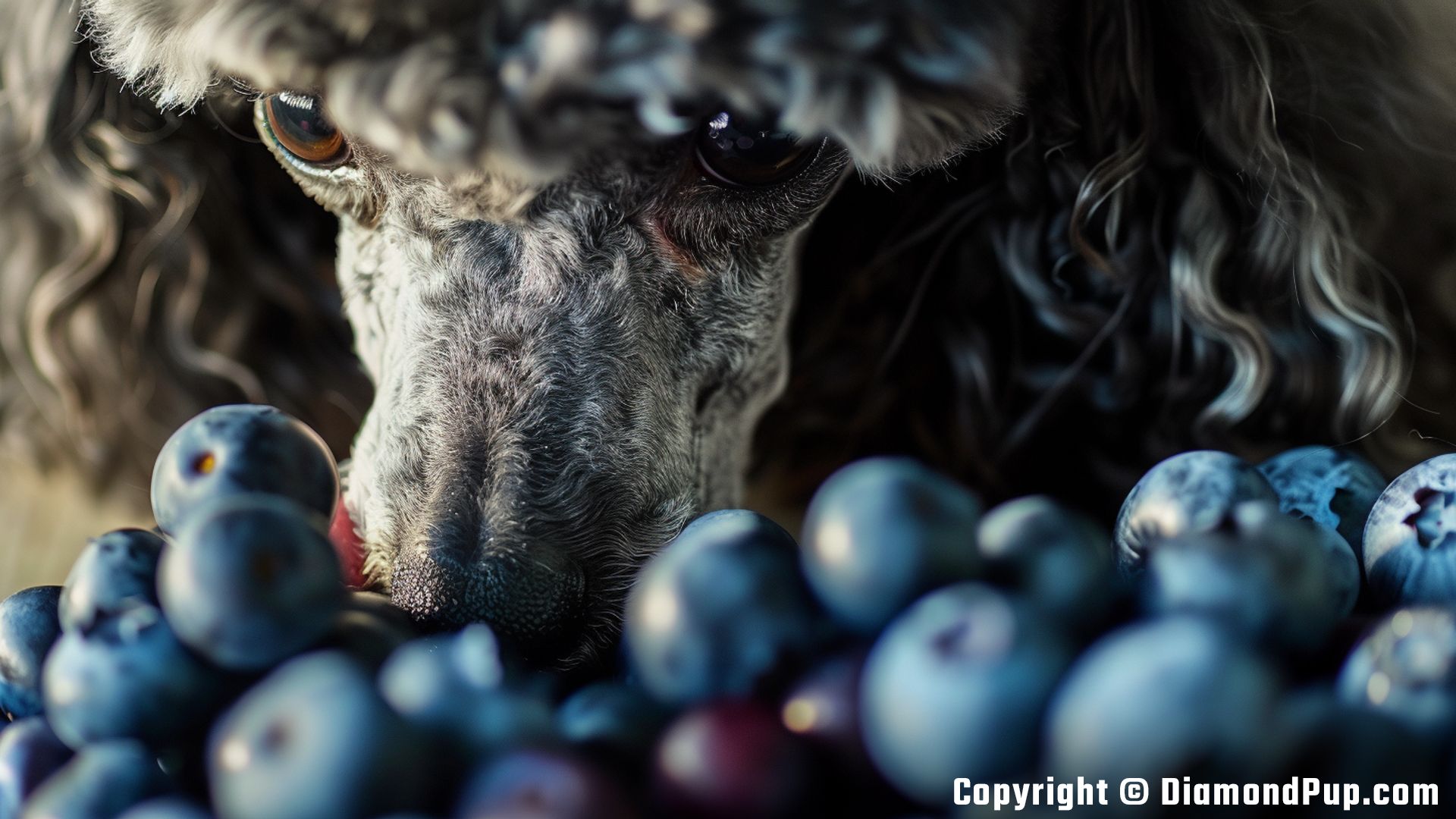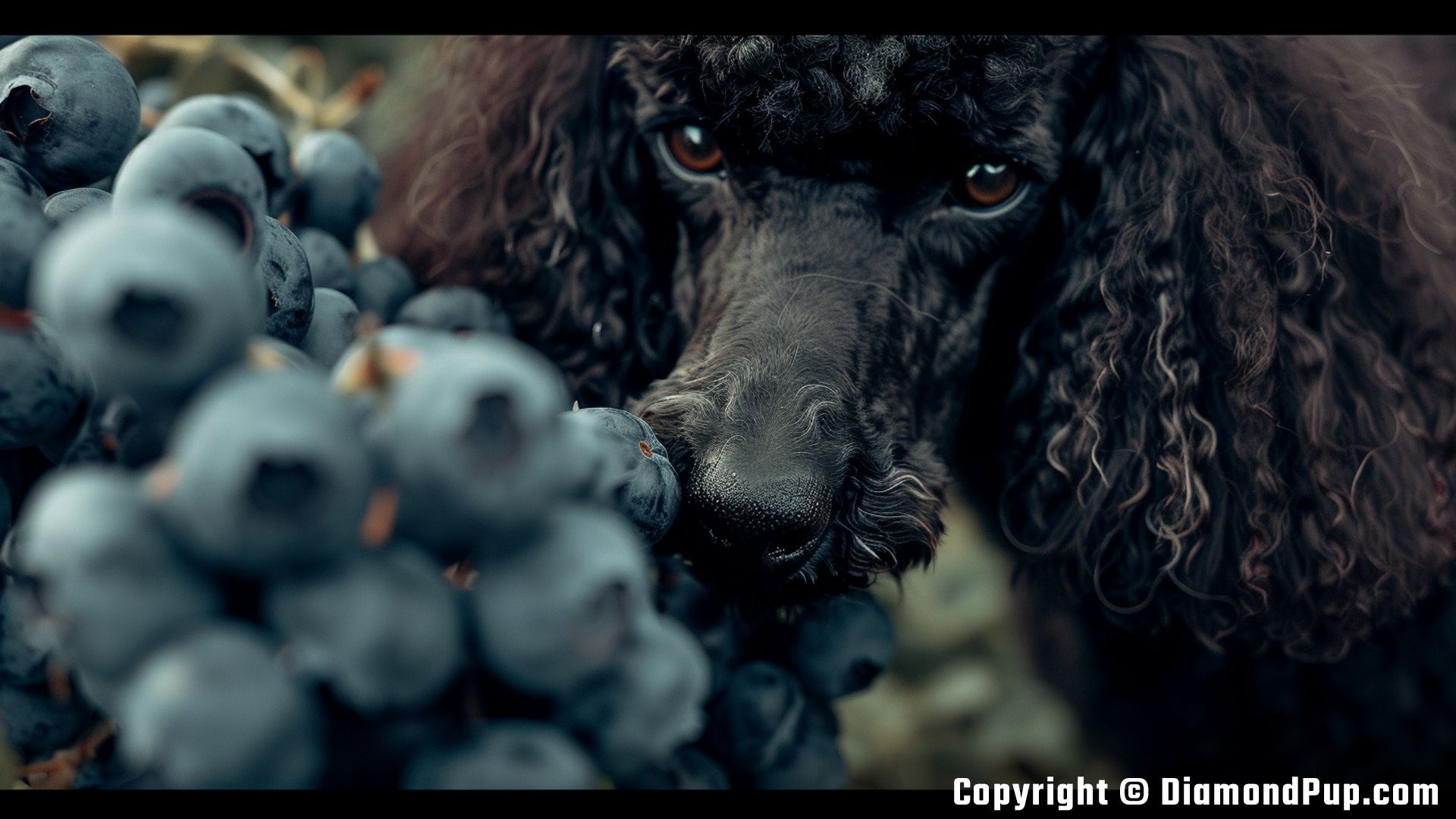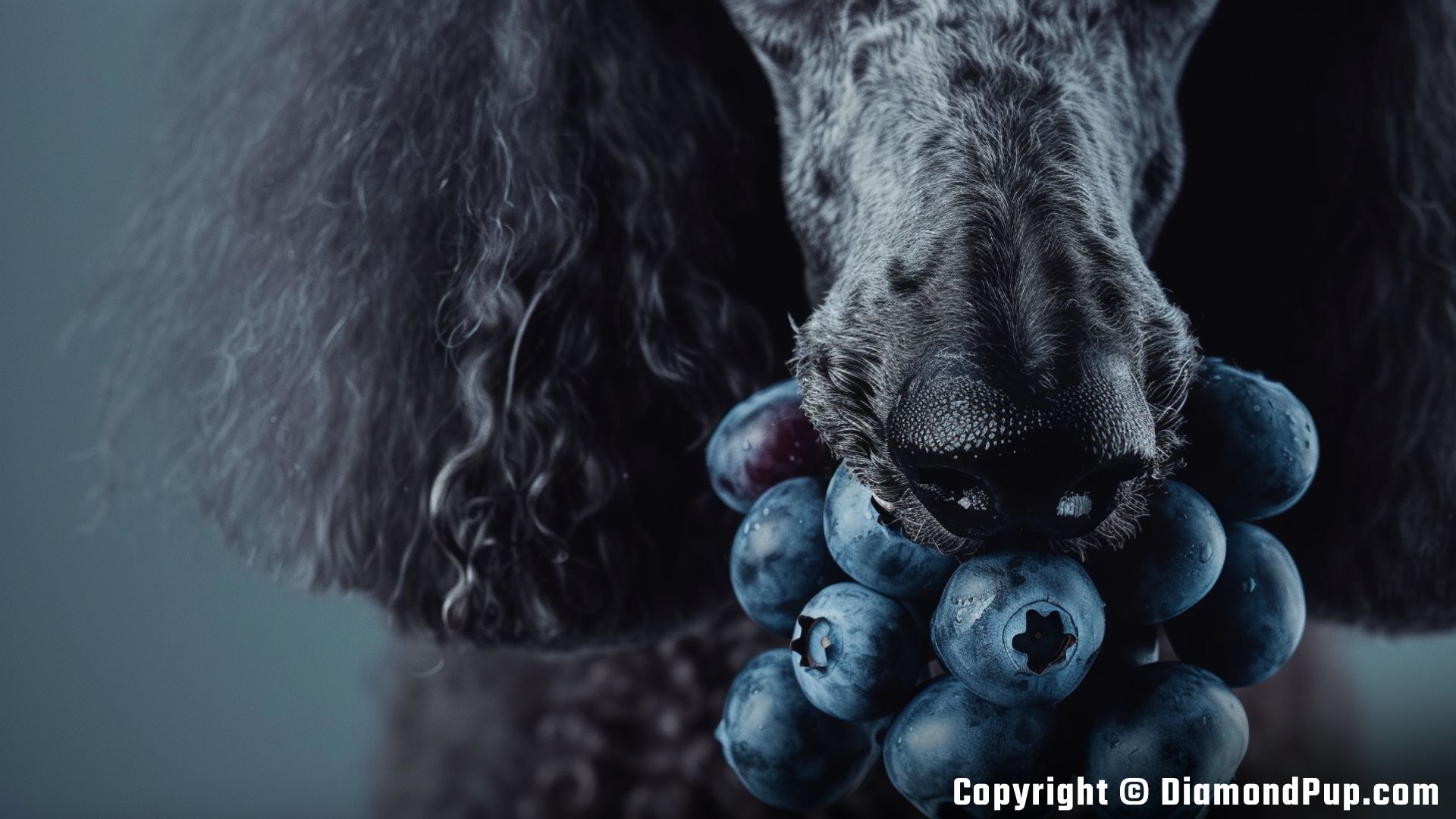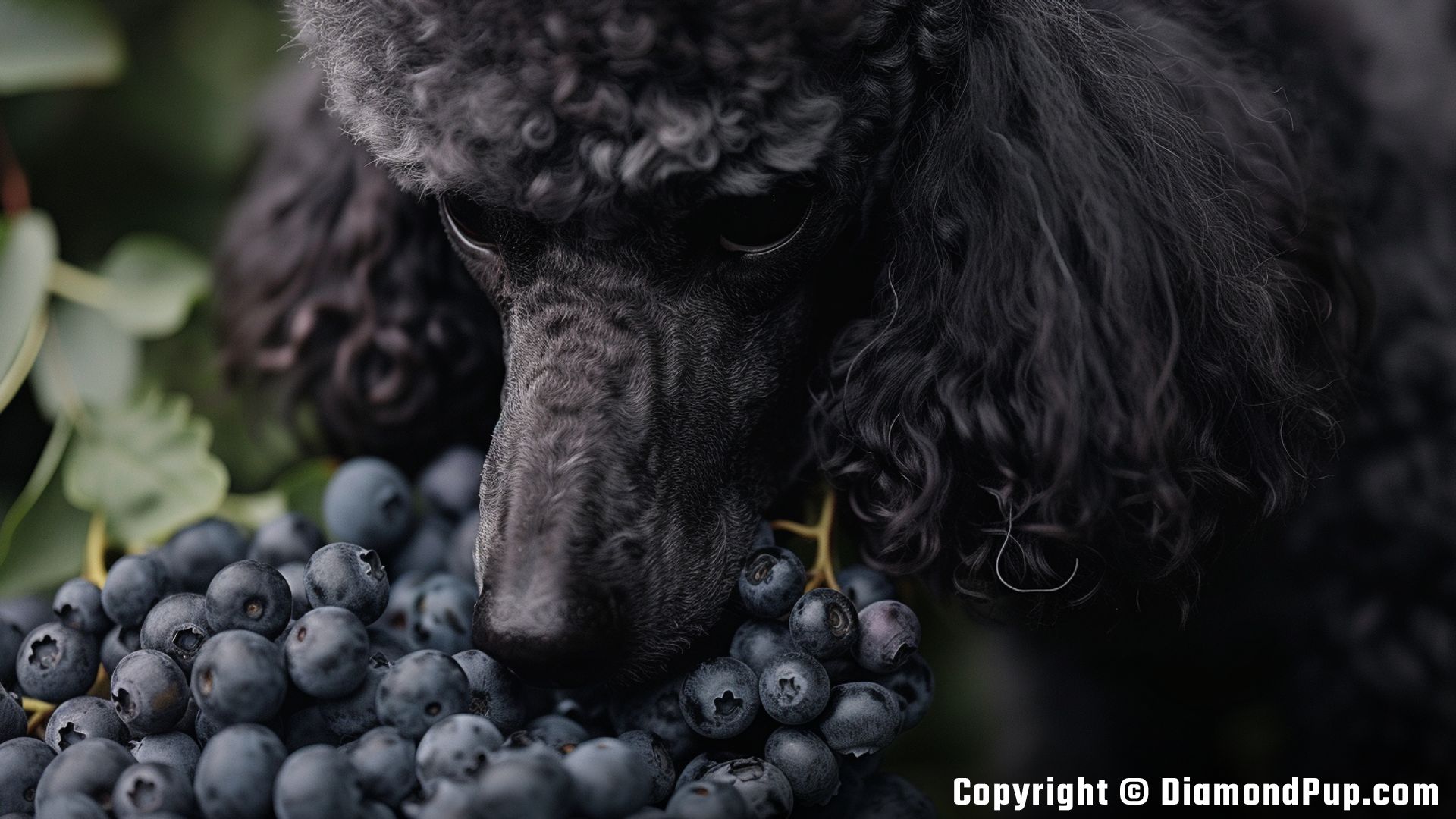Can a Poodle Eat Blueberries?
Date Published: February 12, 2024 | Last Modified: February 16, 2024
Before we dive into the juicy details, let's set the record straight - poodles can indeed munch on blueberries! In this article, we will explore the health benefits that blueberries offer to our fluffy friends, as well as the potential pros and cons of including this tasty fruit in their diet. We will address any safety concerns you may have, including whether blueberries are toxic to poodles. So, if you've ever wondered if it's good for your paw-some companion to snack on these little blue gems, keep reading to find out more!

Are Blueberries Good for Poodles?
When it comes to poodles enjoying blueberries, the answer is a resounding yes! These tiny blue fruits are packed with essential nutrients that can benefit your fluffy companion's overall health. Blueberries are rich in antioxidants, which can help boost their immune system, reduce inflammation, and improve cognitive function. Additionally, the high fiber content in blueberries can aid in digestive health and regulate blood sugar levels. However, it's essential to feed blueberries to your poodle in moderation to prevent any potential stomach upset due to the natural sugars present in the fruit.
As with any new addition to your poodle's diet, it's recommended to introduce blueberries slowly and observe how your furry friend reacts. Always wash the blueberries thoroughly to remove any pesticides or chemicals that may be harmful to your poodle. Remember, while blueberries offer numerous health benefits, they should be part of a balanced diet that meets all of your poodle's nutritional needs. As always, consult with your veterinarian to ensure that adding blueberries to your poodle's diet is appropriate for their individual health status and dietary requirements.

Understanding the Benefits of Blueberries for Poodles
Blueberries are a fantastic treat for poodles due to their high antioxidant content. Antioxidants help to neutralize harmful free radicals in the body, reducing the risk of chronic diseases and promoting overall health. In addition, blueberries are low in calories and packed with vitamins C and K, as well as fiber. This makes them a great option for poodles who may need to manage their weight or improve their digestive health.
For poodles, the antioxidants in blueberries can also support their immune system and cognitive function. These little blue gems are a convenient and tasty way to enhance your poodle's diet while providing numerous health benefits. Just remember to feed them in moderation as part of a balanced diet to ensure your furry friend receives all the necessary nutrients for optimal health.

Nutritional benefits of Blueberries for Poodles
Now, let's talk about bananas for Poodles! Bananas are safe for Poodles to eat in moderation, as they are a good source of essential vitamins and minerals. Bananas contain potassium, vitamin C, and vitamin B6, which can help support your Poodle's overall health. However, it's important to remember that bananas should only be given as an occasional treat due to their high sugar content. Is it safe for a dachshund to eat blueberries Too much sugar can lead to weight gain and other health issues, so it's best to offer bananas to your Poodle in small amounts.

Safely Introducing Blueberries to Your Poodle's Diet
When it comes to safely introducing blueberries to your Poodle's diet, it's important to start small. While blueberries are generally safe for Poodles to eat, it's always best to start with a small amount to see how your furry friend's stomach reacts. Monitor for any signs of digestive upset, such as vomiting or diarrhea. If all goes well, you can gradually increase the amount of blueberries in their diet.
Additionally, make sure to wash the blueberries thoroughly before feeding them to your Poodle to remove any pesticides or contaminants. You can offer blueberries as a special treat or mix them with their regular food for added variety and nutrition. Remember, moderation is key when it comes to treats, including blueberries, in your Poodle's diet.

How much blueberries can a dog eat safely?
When it comes to feeding your Poodle blueberries, moderation is key. Since blueberries are high in natural sugars, it's best to limit the amount you give to your furry friend. A good rule of thumb is to offer blueberries as an occasional treat rather than a daily snack. For a small to medium-sized Poodle, around 1-3 blueberries a few times a week should be a safe and enjoyable amount.
Remember, every dog is unique, so it's important to monitor how your Poodle reacts to blueberries. If you notice any digestive upset or changes in stool consistency after feeding them blueberries, it may be best to cut back or remove blueberries from their diet altogether. As always, consult with your veterinarian if you have any concerns or questions about your Poodle's diet.

Tips to Remember When Feeding Your Poodle Blueberries
When feeding your Poodle blueberries, it's important to remember that moderation is key. While blueberries are packed with essential vitamins and nutrients, too much of a good thing can lead to digestive issues such as diarrhea. Start by offering your Poodle a small amount of blueberries as a treat, observing how their body reacts before incorporating it into their regular diet.
Additionally, always remember to wash the blueberries thoroughly to remove any potential pesticides or harmful chemicals before serving them to your furry friend. Opt for organic blueberries whenever possible to ensure the highest quality and safety for your Poodle's consumption.

Feeding Your Poodle Blueberries
When it comes to feeding your Poodle blueberries, it's important to do so in moderation. These small fruits are packed with antioxidants, fiber, and vitamins that can be beneficial for your furry friend's overall health. However, too many blueberries can lead to digestive issues such as diarrhea, so it's best to offer them as an occasional treat rather than a regular part of their diet. As with any new food, it's always a good idea to start with a small amount to see how your Poodle reacts before offering more.
Remember, while blueberries can be a healthy addition to your Poodle's diet, they should not replace their regular balanced dog food. Consult with your veterinarian or a veterinary nutritionist if you have any concerns about incorporating blueberries into your Poodle's meals, especially if they have any underlying health conditions that may be affected by changes in their diet.

How to properly feed your Poodle Blueberries
When it comes to feeding your Poodle blueberries, moderation is key. Blueberries can be a healthy and tasty treat for your Poodle, as they are low in calories and high in antioxidants. However, it's important to remember that blueberries should not make up a large portion of your Poodle's diet. A few blueberries as an occasional snack or added to their regular meals can be a nice addition to provide some extra nutrients and flavor.
Always wash the blueberries thoroughly before giving them to your Poodle, and be sure to remove any stems or leaves. Additionally, it's a good idea to cut the blueberries into smaller pieces to prevent choking hazards, especially for smaller Poodles. Remember, while blueberries can be a great addition to your Poodle's diet, they should not replace balanced meals specifically formulated for their nutritional needs.

Do Poodles Like Blueberries?
As a veterinarian nutritionist, I can confidently say that poodles generally enjoy the taste of blueberries. These little blue gems are not only delicious but also rich in vitamins, antioxidants, and fiber, making them a healthy treat for your furry friend. Poodles, known for their intelligence and playful nature, often appreciate the extra mental stimulation and tasty reward that blueberries provide during training sessions or as a snack.
It's important to remember that every dog is unique, so while most poodles do enjoy blueberries, some individuals may not be fans of this fruit. If your poodle shows interest in blueberries and tolerates them well, you can incorporate this nutritious snack into their diet in moderation. However, always monitor your poodle for any signs of digestive upset or allergies when introducing new foods, including blueberries.

Special Consideration for Poodles
Poodles are known for their elegant curls and playful personality, but they also have specific nutritional needs that owners should be aware of. As a breed, poodles are prone to developing pancreatitis, a condition that causes inflammation in the pancreas. This means that their diet needs to be low in fat to reduce the risk of triggering this condition. When considering feeding your poodle bananas, it's important to note that bananas are a relatively low-fat fruit, making them a safe and delicious treat for your furry friend.
However, moderation is key when it comes to feeding bananas to poodles, as they are high in natural sugars. Too many bananas can lead to weight gain and potential digestive issues for your poodle. Therefore, it's best to offer bananas to your poodle as an occasional snack, rather than a daily indulgence. As always, it's essential to consult with your veterinarian to determine the best diet plan for your poodle based on their individual needs and health status.

Can Puppies Have Blueberries?
As for blueberries, they are a fantastic treat for poodles of all ages, including puppies! Blueberries are packed with essential vitamins and antioxidants that can support your puppy's overall health and wellbeing. These tiny blue fruits are low in calories and high in fiber, making them a great snack option for poodles who may be watching their weight. Additionally, blueberries are known to have anti-inflammatory properties, which can be beneficial for puppies with sensitive stomachs or skin issues.
When feeding blueberries to your poodle puppy, be sure to offer them in moderation as part of a balanced diet. Too many blueberries can upset your puppy's stomach or cause diarrhea due to their high fiber content. You can serve blueberries fresh or frozen, but always wash them thoroughly to remove any pesticides or harmful chemicals that may be present on the skin. Overall, blueberries can be a delicious and nutritious addition to your poodle puppy's diet!

Are there any Poodles that shouldn't eat Blueberries?
While blueberries are generally safe for poodles to eat, there are some individual dogs who may need to avoid them. Poodles with diabetes should consume blueberries in moderation due to their natural sugar content, which could potentially affect blood sugar levels. Additionally, poodles with a history of gastrointestinal sensitivity or allergies may experience digestive upset or allergic reactions to blueberries. People also ask: are pugs allowed to have blueberries If your poodle falls into any of these categories, it is best to consult with your veterinarian before incorporating blueberries into their diet.
Recipes for Feeding Your Poodle Blueberries
When it comes to feeding your Poodle blueberries, there are a few simple and delicious recipes you can try. One option is to simply wash a handful of blueberries and offer them as a tasty treat. You can also mix blueberries with your Poodle's regular dog food for an added burst of flavor and nutrition. Alternatively, you can blend blueberries with plain yogurt and freeze them in ice cube trays for a refreshing and nutritious snack on a hot day.
Remember to always introduce new foods gradually and in moderation to avoid upsetting your Poodle's stomach. It's also important to consult with your veterinarian before making any significant changes to your furry friend's diet to ensure it aligns with their specific nutritional needs and health goals.
Alternatives to Blueberries for Poodles
While blueberries are a great snack for poodles, another fruit that can be a healthy alternative is bananas. Bananas are a good source of potassium, vitamin C, and vitamin B6, which can help support your poodle's overall health. The soft texture of bananas also makes them easy for poodles to chew and digest.
When feeding bananas to your poodle, remember to always peel the fruit and remove any seeds to prevent choking hazards. It's best to offer bananas in moderation as a treat, rather than a regular part of their diet, as they are higher in natural sugars. As always, consult with your veterinarian before making any significant changes to your poodle's diet.
Common Questions About Poodles and Blueberries
One common question that poodle owners often have is whether blueberries can actually help improve their dog's vision. While blueberries are known for their high levels of antioxidants, particularly vitamin C and E, which can benefit eye health, there is no concrete evidence to suggest that they will directly enhance a poodle's vision. However, including blueberries in your poodle's diet as a tasty and nutritious treat can still be beneficial for their overall well-being.
Another frequently asked question is whether poodles can be allergic to blueberries. While allergies to blueberries are rare in dogs, it is possible for individual poodles to have sensitivities to certain fruits, including blueberries. It is always recommended to introduce new foods gradually and monitor your poodle for any signs of an adverse reaction, such as itching, vomiting, or diarrhea. Consult with your veterinarian if you have any concerns about introducing blueberries into your poodle's diet.
Subscribe Now
Stay updated with the latest news and articles! We'll keep you updated on the latest tips for your pet Poodle
